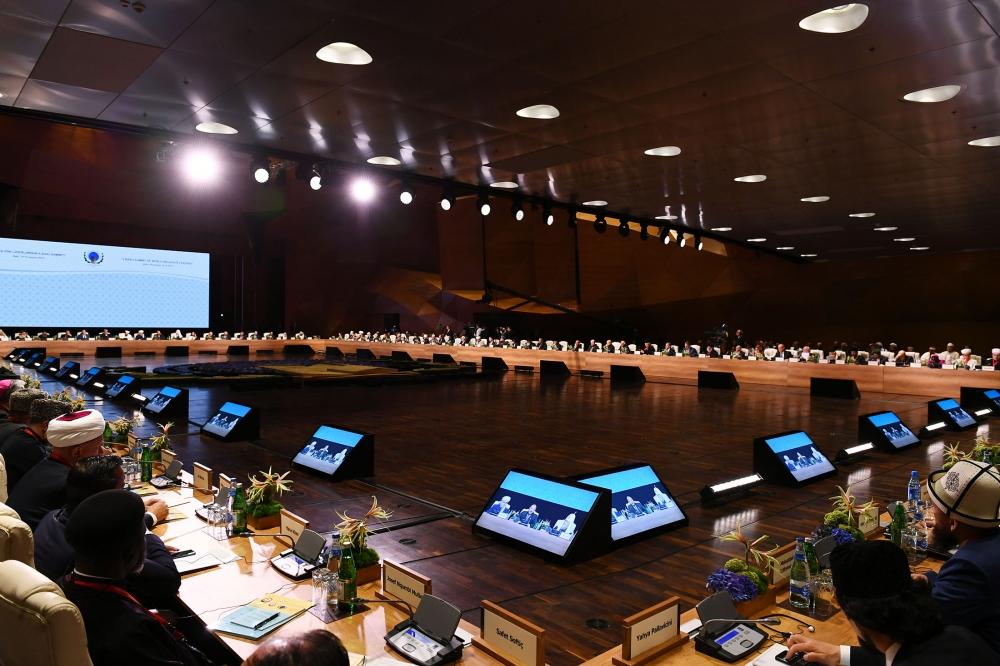BAKU, Azerbaijan, Nov. 15
Trend:
The 2nd Summit of World Religious Leaders is underway as part of the plenary meetings, Trend reports on Nov. 15.
While speaking at the meeting moderated by Chairman of the Section for Dialogue with Muslims of the Pontifical Council for Interreligious Dialogue (Vatican city) Khaled Akasheh, Chairman of the Algerian Supreme Islamic Council Bouabdallah Ghulam-Allah expressed gratitude to Azerbaijan for the opportunity created for world religious leaders.
The chairman stressed that today one of the main topics is related to the 70th anniversary of Chairman of the Caucasus Muslims Office Sheikhulislam Allahshukur Pashazade and the 40th anniversary of his work as Sheikhulislam.
Bouabdallah Ghulam-Allah stressed that people from ancient times profess different religions. “This must not lead to the different opinions,” the chairman said. “Coexistence, tolerance, mutual understanding are very important.”
Azuma Arushi, the representative of the Zen Buddhism school in Japan, said that he visited Azerbaijan for the first time in 2017.
The guest expressed gratitude to Azerbaijani President Ilham Aliyev for participating in such an interesting meeting.
The representative of the Zen Buddhism school said that he is the author of scientific articles on the Islamic religion. Arushi stressed the importance of interreligious dialogue.
While speaking about the significance of the Baku summit, representative of Palestine Mahmoud Sidgi emphasized that each of the speeches which were delivered here call for a dialogue.
“Therefore, proper attention must be paid to the views expressed at the summit,” Sidgi added.
Mardin-Diyarbakir Metropolitan Saliba Ozmen stressed the importance of restoring peace and stability in the world.
“The important calls for strengthening peace and stability are made at the Baku Summit and this is of great significance,” Ozmen added.
Bishop Louka Al-Khoury congratulated Allahshukur Pashazade on his 70th birthday.
The bishop also expressed gratitude to the Azerbaijani president for the initiative to hold such an important event.
"The difference between this summit and other international events is that this forum helps strengthen peace between religions and civilizations," Al-Khoury said.
Mansour Niass, advisor of religious affairs to the Senegalese president, wished peace and tranquility to the peoples of the world.
“The Islamic religion calls the peoples of the world for friendship and brotherhood,” Niass stressed. “Peace and stability are factors that influence the healthy thinking of the future generations.”
Member of the Executive Committee of the European Jewish Congress Yitzchak Dayan stressed that all people living on the planet can be considered members of one family.
“Opinions may vary, but this should not lead to the conflicts between people,” Dayan added.
Member of the Board of Directors of the King Abdullah bin Abdulaziz International Center for Interreligious and Intercultural Dialogue KAICIID Mohamed Sammak stressed that the Baku Summit is a good platform for promoting dialogue, cooperation and mutual understanding.
“We must use this opportunity,” Sammak said.
Chief Mufti of Uzbekistan Usman Alimov spoke about friendly and fraternal relations between the Uzbek and Azerbaijani peoples. Alimov also stressed the cooperation of religious leaders of the two countries.
Muhammad Syamsuddin, chairman of the Indonesian Ulema Council, stressed that the summit, organized in Baku, is an important dialogue platform for the world community.
“World religious leaders obtained the opportunity to exchange the views at the summit,” Syamsuddin added.
Chairman of the Marmara Group Strategic and Social Research Foundation Akkan Suver expressed gratitude to Azerbaijani President Ilham Aliyev for the conditions created for holding such important discussions at the 2nd Summit of World Religious Leaders.
Suver stressed that people belonging to different religions and nationalities exchange the views today.
"This is very important,” the chairman added. “Azerbaijan once again shows its policy of multiculturalism."
Then discussions were held as part of the plenary meeting.






